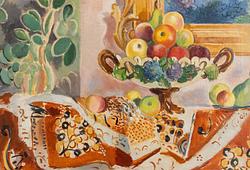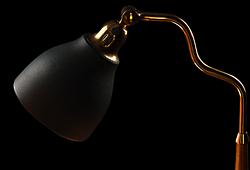A bronze tripod food vessel and cover, "Ding", Eastern Zhou Dynasty.
The vessel is raised on three legs and has a pair of upswept handles. The body is flat-cast with two bands of different dragon scroll separated by a bow-string band and repeated on the domed cover where they are separated by a plain band interrupted by three ring handles. In the center is a medallion formed by overlapping scrolls. The patina is of brown and green color and there is extensive encrustation on the interior. Height approximately 28 cm. Lenght 33,5 cm.
Damages, traces of old repair. Encrustation.
Alkuperä - Provenienssi
Sent to Sweden with M/S Formosa in 1934 by Mr Ingebreth Mossige-Norheim (1883-1944). See the move he made from his journeys through Asia with his wife Gertrud Maria Charlotta Mossige-Norheim during this trip in 1934.
Ingebreth worked as a director and head of chemical aquisitions for Svenska tändksticksaktiebolaget (Swedish Match).
Näyttelyt
Compare a similar sold at Christies: Sale 2580, Fine Chinese Ceramics and Works of Art Part I
New York|13 - 14 September 2012 LOT 1247.
Kirjallisuus
Compare the similar ding and cover illustrated by J. So in Eastern Zhou Ritual Bronzes from the Arthur M. Sackler Collections, Arthur M. Sackler Foundation, Arthur M. Sackler Gallery, Smithsonian Institution, Washington DC, 1995, pp. 158-59, no. 20. The author ascribes the vessel to North-central China, Shanxi-Henan provinces, and notes that a similar vessel is in the collection of the Museum of Far Eastern Antiquities, Stockholm, and also illustrates, p. 160, fig. 20.1, a very similar ding and cover from Shanxi Tunliu Jiajagou, which is dated early 5th century BC.










































































